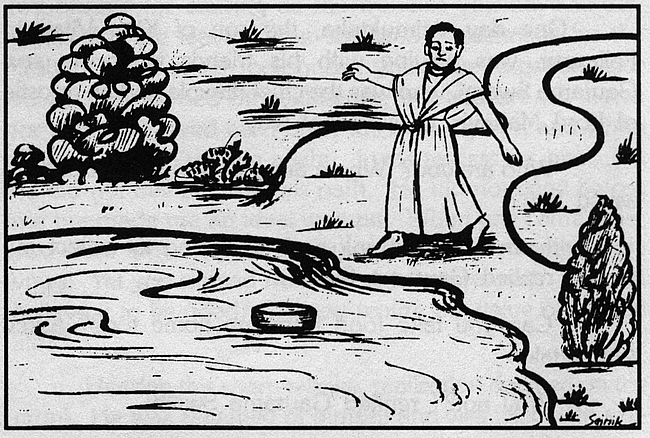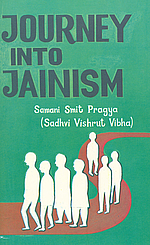One day, Atimuktaka, the son of King Vijay in Pollaspur, was playing with his friends when he saw Gautama Swami, who was the chief disciple and an apostle of Lord Mahavir, passing that way.
"Who are you? Where are you going?" Atimuktaka asked him.
"I am a Jain monk and am going to collect my alms," replied Gautama Swami.
"Can you take food from my home too?" asked Atimuktaka.
"Why not?" replied Gautama Swami.
Atimuktaka brought him to his home holding him by the hand. After taking his food, Gautam Swami returned with Atimuktaka.
Atimuktaka listened attentively to Gautama Swami's lecture about Mahavir Swami and, enchanted by it, instantly and eagerly became ready to leave his household life at once. At first his parents were very reluctant to allow him for his initiation but finally they had to agree. He then became a monk.
One day, while he was out in the forest looking at the river he forgot about his monkhood. He put his begging bowl on the flowing water. He was very elated by it and began to scream joyfully, "My bowl is floating in the river, fast moving on to the other bank, so am I, striving for spiritual mirth, crossing the barrier of death and birth."

My bowl is floating in the river, fast moving on to the other bank, so am I, striving for spiritual mirth, crossing the barrier of death and birth.
Hearing these loud bellows, the other elder monks hurried over. They disapproved of his initiation as a monk and warned him to be more careful in his monkhood. These monks told the whole story to Lord Mahavir and asked whether this monk would be free from karma.
Lord Mahavir replied, "In this very life, this monk will be free from the cycle of life and death."
The Muni ultimately uttained kevalgyana very soon.
 Sadhvi Vishrut Vibha
Sadhvi Vishrut Vibha
